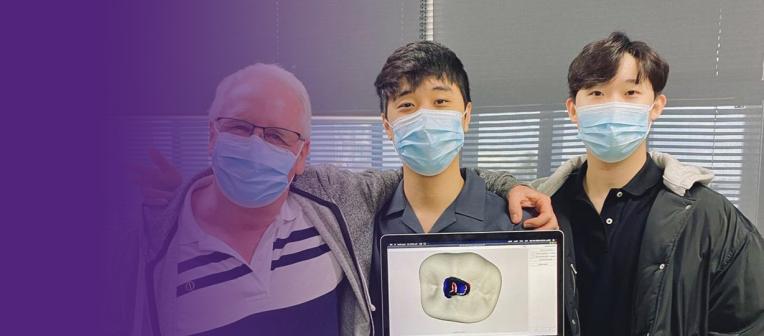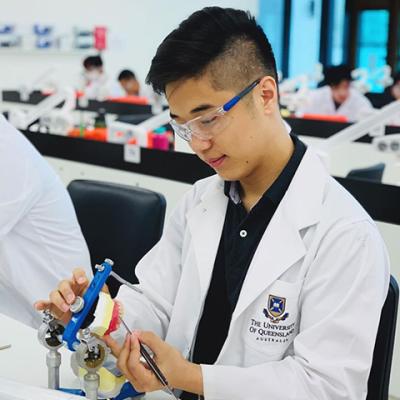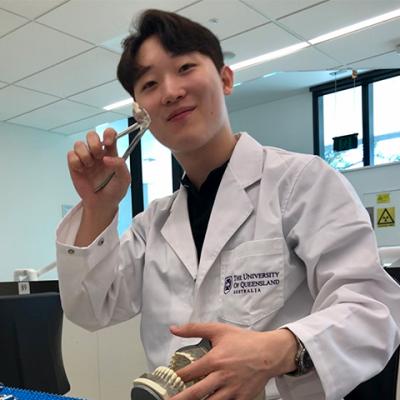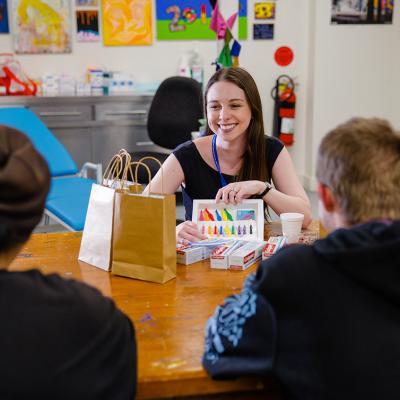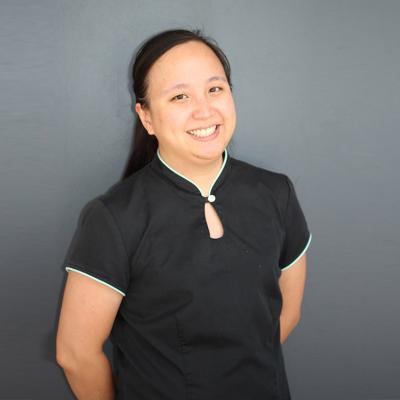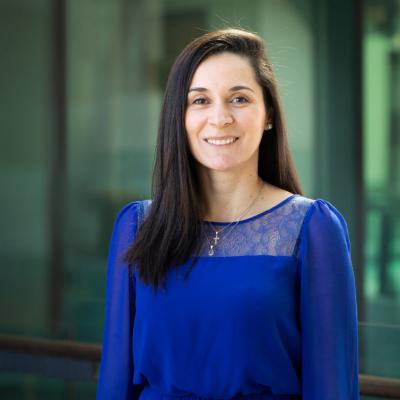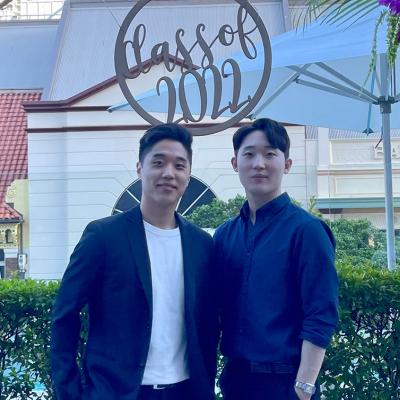Considering studying dentistry at university? You may have lots of questions. We're here to help you find answers.
- What do you study in dentistry?
- is studying dentistry worth it?
- What does a day in the life of a dentistry student look like?
- What kind of job can you get with a degree in dentistry?
We've interviewed 2 UQ students to find out. Sean and Ryan Choi are in their fifth and final year of the Bachelor of Dental Science (Honours). They’ve teamed up to answer some of your questions and share their experiences, to give you a better idea of what to expect from this degree.
Let's find out if dentistry sounds like the study area for you.
What drew you to study dentistry?
Sean: Pursuing dentistry did not cross my mind until I met my clinical mentor, Dr Yul Shin, at the age of 16. When I started shadowing Dr Yul at his private clinic, I knew dentistry was for me. It was the full package – the autonomy, the delicate combination of art and science, the ability to get people out of pain, and the ability to transform someone’s smile and self-esteem in a matter of minutes – I loved all aspects of it.
Ryan: I was genuinely interested in all facets of healthcare in high school, but I had very limited knowledge in dentistry as a career option, as the only encounters I have had with dentistry were as a patient. However, doing volunteer experience at a community dental clinic really opened my eyes. I loved the pristine environment, the focus of my dentist, one-on-one interaction between the dentist and the patient, and, most importantly, the feeling of building trust and providing the best care for the patient. Since then, I worked very hard to achieve my dream, and now I'm at UQ!
"I am loving all aspects of dentistry – even more than I expected."
What are the most valuable skills you’ve learnt while studying dentistry?
Sean: Empathy. In dentistry, we sometimes see patients who have a complex medical and dental history who present with decayed teeth throughout their mouth. Unfortunately, it is not as simple as telling them to “start brushing” to get them out of their poor dental situation. Often, the patient is going through many simultaneous hardships – financially, socially and medically, and, put simply, teeth are not always a top priority. I have come to learn that when discussing and providing treatment options to patients with complex needs, it is important to see where they are coming from. I like to look at their situation from a holistic, empathetic perspective to provide the best practical help I can as their dentist.
What’s the most unexpected thing you've learnt while studying dentistry at UQ?
Sean: Patients like to ask to go to the toilet at the worst possible moment!
Ryan: Countless dentists suffer from neck, shoulder, and back pain. Get your ergonomics right from the start!
So, what’s it really like to study dentistry?
Sean: It’s rewarding. It is a field where we combine the best of art and science to make a difference in people’s lives.
Ryan: It’s very interesting. We learn something new every day from clinics, lectures and workshops.
What does a day in the life of a dentistry student look like?
Sean: It depends on the year level you’re in. Throughout years 1-2, a lot of time is spent in the pre-clinical lab homing in our hand skills, working on mannequins and plastic teeth. In years 3-5, time is allocated to seeing actual patients in clinics, leading to placement in year 5 where we attend to patients.
I would say no two days are truly the same as a dental student. We could be melting wax rims to make a denture for an elderly patient who has not been able to chew for years, while the next day, we could be soothing a nervous and crying child who is getting their first baby tooth extraction.
Ryan: To add to what Sean mentioned, in earlier years, much time is spent on the theoretical aspects of dentistry through lectures and practical sessions (such as basic foundational knowledge, general science, clinical scenarios, and case studies). We also covered clinical aspects of dentistry through pre-clinics and clinics, where we would be practising scale and cleans, administering local anaesthetics and taking impressions on each other to prepare for working on actual patients later on.
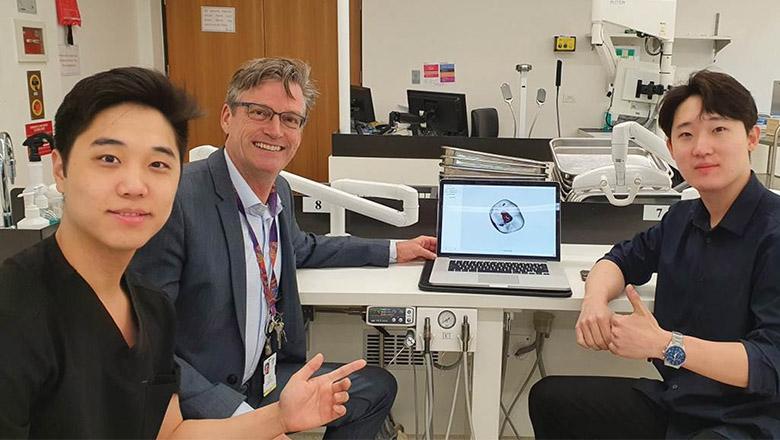
In the 5th year of the Bachelor of Dental Science (Honours), as part of the thesis project, students collaborate with professors to publish a research paper. Pictured here with Sean Choi, Ryan Choi and Prof Ove Peters is an educational software program (developed through the research project) that is able to guide and provide feedback to students' drilling near real-time.
What’s the most interesting thing you’ve learnt that hasn’t been part of the coursework?
Ryan: Digital dentistry! The advancement of computing power has increased remarkably with modern technology, and it is interesting to witness dentistry changing and evolving. Digital dentistry is becoming more common, which is making some procedures simpler and quicker. I had an opportunity to shadow my seniors, Dr Leo Ham and Dr Joshua Shieh, and it was fascinating to observe how technology could intertwine with dentistry in a private dental clinic in the form of CBCT, 3D scan (CEREC) and printing, and Invisalign.
How have your teachers had a positive impact on your studies?
Ryan: In a field like dentistry, teachers (professors, clinical supervisors, pre-clinic supervisors, lecturers, research supervisors, other staff members) are crucial in helping students’ growth academically, clinically, and interpersonally. As there are both simple and complex challenges every day in the clinic and outside of the clinic, it is very important that students have someone with experience to discuss these challenges with, and I am very grateful that we have such amazing staff members at UQ Dentistry. Especially in the clinic, there are times where I can feel hesitation completing certain procedures, so this is when clinical supervisors step in.
Sean: I think Ryan summarised this one excellently. Clinical supervisors, professors, and other staff members at UQ Dentistry are very approachable and are always there to provide support or advice if needed. We wouldn’t be here without them.
Where do you want to go or what do you want to do in your dentistry career?
Sean: I am incredibly excited about the future of technology in dentistry. I believe it is an exciting time to join the dental field as technology such as CBCT, 3D scan (CEREC) and 3D printing, and dental materials (i.e. MTA) are getting more affordable, precise, and adopted. I hope to incorporate them into my future clinical practice. Aside from my day-to-day practice, I also hope to make an impact in the dental community. I am fortunate to have seen the vast diversity in careers that a dental degree can provide by having met Dr Christine Kim, who I consider a valuable mentor and gave me valuable insight into private dental practice.
"Other mentors of mine are Prof Ove Peters and Prof Christine Peters who challenged me to grow as a researcher, and Prof Alex Forrest who taught me the importance of community leadership. Ryan and I are both incredibly inspired by them and one day hope to make a difference in the dental community by following in their footsteps."
Ryan: I wholeheartedly agree with Sean, and I am also very excited about the future of technology in dentistry. In terms of where I want to go in my dentistry career, I am still exploring the field, as there are so many aspects in dentistry. We are very fortunate to have great mentors allowing us to explore and engage in different fields of dentistry. In fact, with their help and guidance, Sean and I have been able to work on our research papers involving digital technology in Endodontics and Forensic Odontology – 3D software and 3D Scan.
What have you learned about yourself since you started your studies at UQ?
Ryan: How important it is to really be confident in what you’re doing and believe in yourself. Especially in a clinic, it is important to be confident and know what you’re doing, and at the same time, carry out a role as a team leader – be able to cooperate with different healthcare professionals to provide the best care for the patients.
Sean: I’ve become more sure of what I am passionate about. UQ offers numerous opportunities to get involved and explore your passion, ranging from research to shadowing specialists. As a result, it didn’t take long for me to learn what drives me and what doesn’t get me out of bed in the morning. I’m grateful for the opportunities that UQ has provided me with.
What advice would you give to someone who wants to study dentistry at UQ?
Sean: UQ Dentistry’s focus on practical skills is phenomenal, and if you’re considering studying dentistry at UQ, rest assured that you’ll be graduating with solid mentoring from your clinical supervisors and various quality and interesting cases under your belt. If your filling or crown doesn’t look the best from the start, don’t stress! Your hand skills will come with time. Place focus on building good relationships with your patients, because at the end of the day, dentists do not just care for teeth; they must remember to care for the person behind the teeth too.
Ryan: My best piece of advice for students who are interested in studying dentistry at UQ is make sure to do a lot of research about what careers are possible, try shadowing a dentist for a couple months, and ask current dental students what it’s like to study dentistry at UQ. This will give you a general idea about the career paths you could take, and it will make you feel more prepared and confident about what you are about to commit to for the rest of your life.
Explore the Bachelor of Dental Science (Honours) or discover what it's really like to study other programs at UQ.

